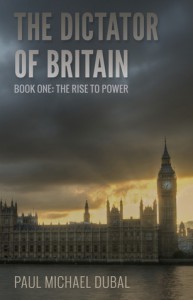The Dictator of Britain: Book One: The Rise to Power

A review of a book that came out in 2013 might seem woefully behind the curve. While that may be true, I’m going to be reviewing book two of this series—The Dirty War—that came out in April 2017 and the third volume of the trilogy, The End of Days—which came out this June. I didn’t think I should bypass the first part of the series so my reviews of volumes two and three can be as informed as possible.
I have both good and bad news. The good news is that The Rise to Power is a powerfully written epic that is absorbing as it builds and builds with changing settings, evolving characters, and a wide panorama of events that demonstrate what England might become if the country undergoes such a social collapse that voters bring in a far right government that promises, at the very least, to make life difficult for immigrants and reduce the impact of the welfare state.
The bad news is that this not-so-brave new world is unnervingly realistic and seems much too believable and prophetic. In 2013, Paul Dubal seemed to see Brexit coming. His prime minister, Lawrence Pelham, has a lot in common with America’s Donald Trump. The main difference is that Pelham has a five year plan which is much more sweeping and destructive than Trump’s immigration cuts, proposed wall with Mexico, and deportation of illegal U.S. residents.
Dubal’s Pelham has a far tighter grip on power than any leader of a Western democracy has had since Hitler. Young brutal British males on the prowl, calling themselves FREE—the Fight to Return England to the English—are more than evocative of similar Nazi thug squads in the 1930s. Donald Trump may complain that news items he doesn’t like are “fake news”; Pelham’s government suppresses any news stories they don’t like. In addition, the internet and social networks are severely censored. Further, Pelham plans to create a totalitarian state with measures like deportation camps, the Minority Registration Act, ethnic cleansing and the end of pretty much all civil rights.
Many characters are actors in specific scenes and passages that illustrate one aspect or another of the chilling vista of Pelham’s new Britain. One continuing and important figure is disgraced journalist Harry Clarke who becomes the center of a far-reaching manhunt when he is given a disc containing Pelham’s secret five year plan before it’s revealed to the general population.
But it’s not official “law enforcement” who capture Clarke. It’s a small cell of the Independent Socialist Party led by Clarke’s former girlfriend, Julianne. Can a small, ragtag group of untrained rebels accomplish anything against the might of England’s military and political might? Can they act more humanely than Pelham’s forces?
While the era we live in is filled with often depressing if very readable dystopian novels, I can’t help but think of Sinclair Lewis’s 1935 It can’t Happen Here where circumstances very like what happens in Rise to Power take place, only in the U.S.. Depending on an author’s own political stance, their books either worry about
a too socialist left wing takeover or a right wing Fascist regime. More sci fi oriented writers explore the impact of climate change and global warming. Whatever a book’s themes, few speculative novels are very optimistic beyond offering us the independent and rebellious natures of future heroes and heroines opposed to whatever authoritative rule has taken control.
If you’re like me, you’ll find it difficult to read The Rise to Power and not plan on going on to delve into The Dirty War and The End of Days. Perhaps that’s where I will find an reasonably optimistic outcome. It can’t happen here, whether the U.K., the U.S., wherever you live? Why not?
This review first appeared at BookPleasures.com on Aug. 18, 2017
http://dpli.ir/TX1GNt



